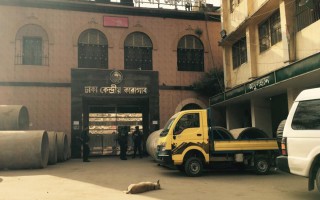Hearing of Khaleda’s case to be held in jail
The government has set up a makeshift courtroom at the old Dhaka Central Jail on Najimuddin Road for holding trial of jailed Bangladesh Nationalist Party chairperson Khaleda Zia as she was staying there.
Law minister Anisul Huq told New Age on Tuesday that a gazette notification was issued on the day declaring the old jail a court for the trial of Khaleda in the Zia Charitable Trust graft case considering her security.
Bangladesh Nationalist Party opposed the government move.
At an emergency briefing at Khaleda’s Gulshan office, BNP secretary general Mirza Fakhrul Islam Alamgir said that the makeshift courtroom in jail was unconstitutional and holding Khaleda’s trial there would be a violation of the law.
The law minister, however, denied the allegation, saying, ‘Does he [Fakhrul] understand the constitution? I request him to read the Bangladesh constitution, not the Pakistan constitution.’
Khaleda has been at the jail since February 8, when the Dhaka Special Judge’s Court-5 jailed the former prime minister for five years in Shaheed Ziaur Rahman Orphanage Trust graft case.
Anti-Corruption Commission public prosecutor Musharraf Hossain Kajol said that the decision was made as Khaleda was skipping the hearing in the case, now at the final stage.
‘So, we have suggested that the court should be instituted where she is living now instead of Alia Madrassah playground at Bakhsikazar,’ Musharraf told reporters before he met Dhaka Central Jail officials Tuesday afternoon.
A senior official at the prison said that three rooms near the entrance of the old jail were managed, chairs were placed and necessary arrangements were already made for the trial.
Replying to a query, Musharraf claimed that the court in the prison would be an open court and people and press would have access to the court.
‘It would not be wise to compare the court with what a previous government had done,’ Musharraf replied when he was asked whether it seemed similar to the ‘court’ instituted in 1976 for the trial of former lieutenant colonel BAbu Taher and his political fellows.
Defence lawyers, however, said they were unaware of the decision, and termed the decision unlawful, and unprecedented.
‘We consider the trial inside the prison unlawful,’ said Aminul Islam, one of the lawyers acting for Khaleda. Another lawyer Zakir Hossain Bhuiyan also branded the trial inside jail as unprecedented.
In August, Dhakja Special Judge’s Court-5 judge Md Akhteruzzaman set September 5 for the next hearing in the Zia Charitable Trust graft case.
On August 8, 2011, the Anti-Corruption Commission filed the case with Tejgaon police station accusing four people, including Khaleda, of abusing power in raising funds for the trust from unknown sources.
The same court on February 8 jailed Khaleda in the Orphanage Trust case.
Musharraf also said that they had tried to hold the trial through the video conference brining some changes to the Evidence Act, but now they were ready to hold the trial inside the prison.
On February 19, 2017, New Age reported that the government was considering the introduction of trials of criminal cases through videoconferencing keeping ‘notorious’ accused inside jails.
Rights activists, however, had said that the proposed system might be used against politicians in politically motivated cases while criminal law experts said that it would be contrary to the existing laws, and the proposed system might be misused against politicians and people would question its fairness.
Section 352 of the Code of Criminal Procedure stipulates, ‘The place in which any Criminal Court is held for the purpose of inquiring into or trying any offence shall be deemed an open court, to which the public generally may have access, so far as the same can conveniently contain them.’
On July 26, 2014, New Age reported that the government had planned to hold the trial of a case filed under explosives act for the BDR Mutiny at another makeshift courtroom inside Dhaka Central Jail instead of existing makeshift court at Bakhshibazar.
The government retreated from the decision and the trial continued in the makeshift courtroom at Bakhshibazar.
A court official, who dealt BDR carnage and mutiny cases, had said that the government had planned to hold the BDR carnage trial inside prison but later cancelled the plan to avoid controversies.
In January, New Age reported that the government was planning to hold the trials of the rest of the cases against Khaleda at the makeshift court, which primarily built for trial of over 800 members of Bangladesh Rifles, now renamed as Border Guard Bangladesh.
Dhaka Central Jail’s retired superintendent Farman Ali said that only the trial of retired lieutenant colonel Abu Taher along with others was held inside the jail during Martial Law. ‘It’s unprecedented during a democratic government.’
In a judgement on March 22, 2011, the then High Court bench of Justice AHM Shamsuddin Choudhury and Justice Sheikh Md Zakir Hossain mentioned that a special martial law tribunal sentenced Abu Taher to death on July 17, 1976 and Taher was hanged on July 21, 1976 in Dhaka Central Jail.
Proclamations, rules and orders issued during the period from November 29, 1976 to April 9, 1979 were all illegal and void in the eye of law, read the judgement.
Jail officials said that apart from Taher, no information was found about any other trial inside the jail.
News Courtesy: www.newagebd.net











